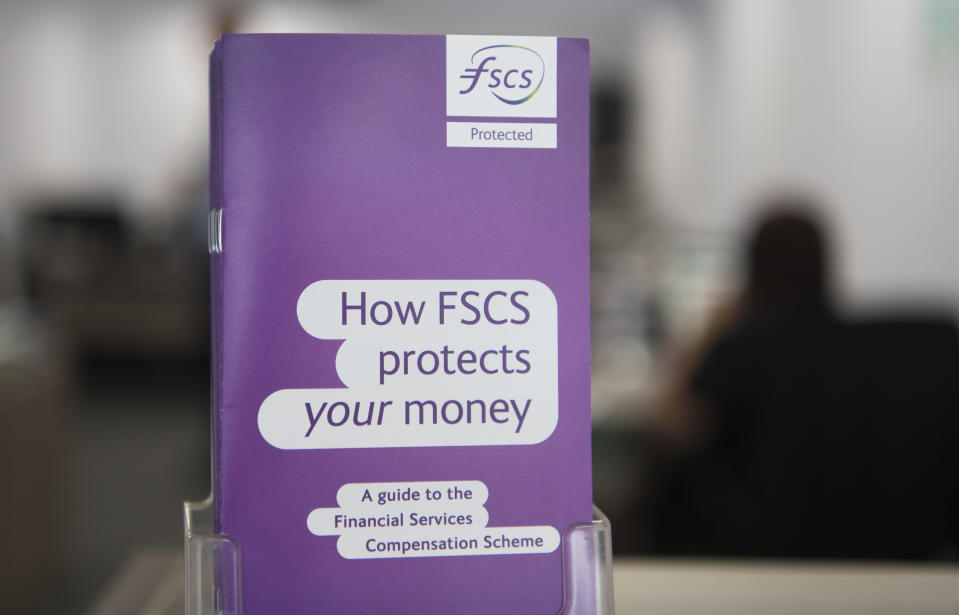Hundreds of investors in bust £237m bond scheme miss compensation

Most investors in collapsed mini-bond scheme London Capital and Finance (LCF) look set to miss out on compensation from a government-backed scheme.
The Financial Services Compensation Scheme (FSCS) on Thursday delivered its first verdict on whether LCF investors were eligible for compensation, after the investment scheme collapsed at the start of last year.
The FSCS said it had reviewed about 450 out of 11,600 cases and concluded less than half qualified for money.
Just 159 bondholders who switched their money from stocks and shares ISAs to LCF bonds will get FSCS money. The eligible claims amount to just £3.1m ($4m) of the total £237m invested in LCF and the FSCS told Yahoo Finance UK it is “still too early to say the amount of compensation that will be paid.”
A further 283 bondholders who dealt with LCF before it was authorised in June 2016 are not covered, the FSCS said. Many other cases still need to be reviewed but the FSCS warned most were unlikely to be successful.
READ MORE: Government 'unsympathetic' to major bust bond scheme investors
“While FSCS maintains that the act of issuing mini bonds is not a regulated activity, and is therefore not something we protect, we have concluded there will be some customers who were given misleading advice by LCF and so have valid claims for compensation,” the organisation said in a statement.
“However, we expect that many customers will not be eligible for compensation on this basis.”
Asked to clarify how many the FSCS expects to be able to claim back money, a spokesperson said it was “still too early in our investigations to say.”
‘A bad outcome’
Thomas Donegan, a partner at law firm Shearman and Stirling acting on behalf of some LCF bondholders, said the decision was “a bad outcome for victims of financial crime, erodes trust in our regulatory system and sends out the wrong message to would-be operators of Ponzi schemes.”
Around 11,600 people put £237m into LCF, many of them elderly pensioners. Most believed they were buying fixed rate ISAs that were protected by the FSCS, a government scheme meant to safeguard retail money. The investment products were actually high-risk bonds.
LCF collapsed at the start of 2019 and administrators have warned that investors could get as little as 25% of their money back. The Serious Fraud Office is investigating and arrests have been made. The government has also launched an independent inquiry into the collapse.
READ MORE: Britain suffering financial crime 'epidemic', watchdog warns
“LCF marketed fixed rate ISAs, under the auspices of financial regulation by the FCA and registered with Her Majesty's Revenue and Customs as an ISA provider,” Donegan said.
He said it was “absurd” and “illogical” that investors who bought “identical products” would end up with different out comes.
“At the end of the day, you’ve got a bunch of retail investors who invested in the same products and all received grossly misleading materials,” he said.
Donegan said the FSCS’s decision suggests just “a small number” of bondholders will ultimately get compensation. The FSCS’s preliminary verdict comes after sustained pressure from LCF investors who lost money.
Mini-bond ban
The FSCS said: “While we acknowledge that many customers were given incorrect information about investing in LCF bonds, being given incorrect information on its own doesn’t constitute misleading advice.
“For that reason, and based on our investigations so far, we believe many LCF customers are unlikely to be eligible for compensation on the basis of misleading advice.”
The organisation said it would continue reviewing cases and provide an update in due course.
LCF’s collapse is the highest-profile failure in the mini-bond sector, which has exploded in popularity in recent years. Mini-bonds are unregulated investment products mostly sold online that offer high rates of interest. They became popular with investors due to sustained low interest rates but carry high risks, which many investors are not aware of.
The Financial Conduct Authority banned online adverts for mini-bonds in November, saying it was “concerned” investors couldn’t deal with “the risks involved.” At least £1bn was lost from mini-bond firms going under in 2019, according to BondReview.co.uk, a blog that follows the space.
The FSCS was set up in 2001 as a deposit insurance scheme to protect savers in case firms they put their money into went bust.
READ MORE: Watchdog bans ads for high-risk mini-bonds after millions lost

 Yahoo Finance
Yahoo Finance 